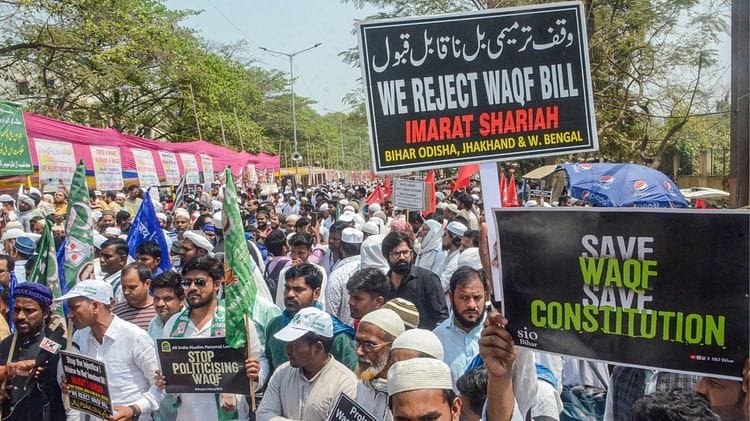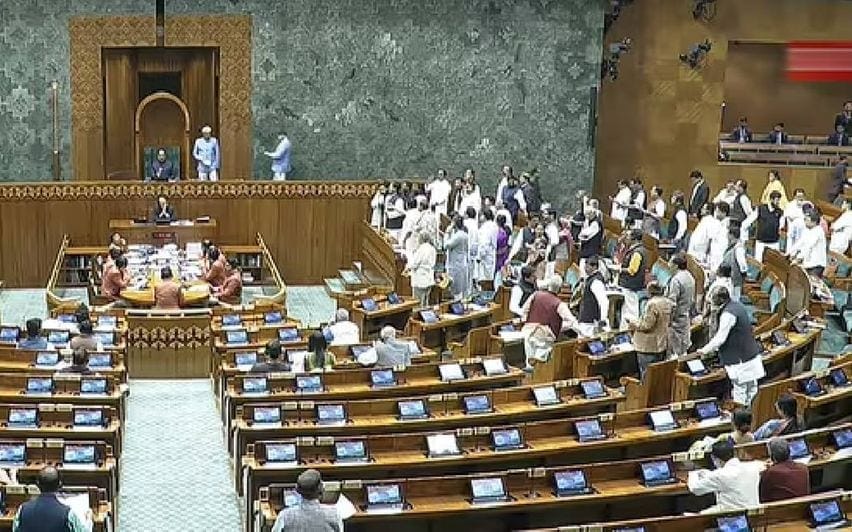Bill WHAT’S HAPPENING?
Parliament is set for a massive showdown between the Centre and Opposition as the Waqf (Amendment) Bill, 2024 will be taken up for discussion and passage in the Lok Sabha on Wednesday.
The Waqf Bill is likely to come before the Rajya Sabha on Thursday.
Minorities and parliamentary affairs minister Kiren Rijiju told reporters that the Lok Sabha’s business advisory committee (BAC), which includes leaders from all major parties and is chaired by Speaker Om Birla, agreed on an eight-hour debate.
What is Waqf?

Waqf (pronounced wakf) is an Islamic practice where a person gives away something they own (like land, building, money, etc.) for a religious or charitable purpose, and once it’s donated, it can’t be sold, given away, or inherited. It’s meant to benefit people forever.
Example:
Let’s say someone donates a piece of land to build a school or a mosque. That land becomes waqf. Now it belongs to God and must always be used for that good purpose. No one can sell it or claim it for personal use.
Who manages it?
A special committee or Waqf Board manages waqf properties, making sure they are used properly-for
things like:
- Mosques
- Schools
- Orphanages
- Hospitals
- Helping the poor
The Waqf (Amendment) Bill, 2024 aims to update the Waqf Act of 1995, which governs the management of waqf properties.
The All India Muslim Personal Law Board (AIMPLB) announced a nationwide agitation against the Bill.
The Congress called the Bill an assault on the Constitution, and an attempt by the BJP to keep society in a state of “permanent polarisation” for electoral gains.
Here are five of its most contentious provisions.
NON-MUSLIM MEMBER

The 2024 Bill proposed allowing a non-Muslim Chief Executive Officer, and at least two non-Muslim members to be appointed by state governments to their state’s waqf board.
The Joint Parliamentary Committee (JPC) allowed two amendments to this provision – that the appointee shall be an officer at the Joint Secretary-level or higher, and that she shall have knowledge of Muslim law and jurisprudence.
But the fundamental contention remains, namely, that non-Muslims should not be a part of waqf boards, given it is a religious matter.
POWER TO GOVT
The 2024 Bill gave the District Collector the power to determine if a disputed property is a waqf or belongs to the government.
This determination is currently made by the Waqf Tribunal.
The JPC accepted an amendment to the provision, which now gives this power to a state government officer who is more senior than the district collector.
However, it will still be a state government officer judging the state’s own case against a waqf.
Critics fear that the officer is likely to rule in favour of the government in such disputes.
REMOVAL OF “WAQF BY USER”
The 2024 Bill does away with the concept of “waqf by user”, which is a part of the 1995 law.
This refers to a property that is treated as waqf based on its long-term use for religious or charitable purposes, even without formal documentation.
Several mosques and graveyards could fall in this category.
By omitting provisions related to “waqf by user”, the Bill can potentially create disputes surrounding long-time waqf properties which, for whatever reason, do not have a valid waqfnama.
WAQF DATA BASE
 The 2024 Bill required every waqf property to be registered on a central database within six months of the law’s commencement.
The 2024 Bill required every waqf property to be registered on a central database within six months of the law’s commencement.
Any “government property” in this database would be flagged to the District Collector, who would then make an inquiry into the matter
Notably, the Bill effectively ensured that not registering on the portal would result in forfeiting the right to move a court in case of an encroachment or dispute involving the waqf land.
While the JPC accepted amendments giving the Waqf Tribunal power to extend the timeframe of registration in some circumstances,
What these circumstances could be was left to the Tribunal’s discretion.
TRIBUNAL DECISION NOT FINAL
The Bill has also changed how the Waqf Tribunal will be formed.
It states that it will comprise a District Judge, and a state government officer of Joint Secretary rank as its members. Another crucial change in the new Bill is that it has removed the provision that made the Tribunal’s decision final. The Bill allows Tribunal decisions to be challenged in the High Court.
On Tuesday, JD(U) MP and party national working president Sanjay Jha said that Bihar Chief Minister Nitish Kumar’s work for the Muslim community has been “visible” for the “past 19 years”, and he has “never allowed anything against the Muslim community to happen”.
Jha said that JD(U) members in the Joint Committee of Parliament had said that the provisions of the Bill “should not be implemented with retrospective effect,
And there should be no effect on something which has been the way it is in the past”.
